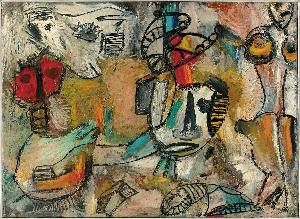Giuseppe Pinot-Gallizio
Giuseppe Pinot-Gallizio;Pinot Gallizio
Place: Alba
Born: 1902
Death: 1964
Biography:
, an Italian painter, was a prominent figure in the development of industrial painting and a founding member of the Situationist International. Born in 1902 in Alba, Piedmont, Italy, he became an independent Left councilman and a chemist before pursuing his passion for art.
Early Life and Career
Pinot-Gallizio's background as a chemist played a significant role in his development of new painting techniques. In 1955, he met Asger Jorn, with whom he co-founded the Experimental Laboratory of the Imaginist Bauhaus in Alba. This laboratory was part of the International Movement for an Imaginist Bauhaus and was attended by artists such as Enrico Baj, who experimented with nuclear painting techniques, and Walter Olmo, who worked on musical interventions.
Industrial Painting and the Situationist International
In 1956, Pinot-Gallizio, along with Jorn, organized the First World Congress of Free Artists, which foreshadowed the foundation of the Situationist International in 1957. He helped to make the SI known in the art world with an exhibition in Paris in 1959. However, he left the SI in 1960 as it became more focused on political action.
Notable Works and Legacy
Many of Pinot-Gallizio's works were industrial paintings, intended to cover large areas rather than small images. One notable example is the Cavern of Anti-Matter, composed of 145-meter canvases painted by hand or with machines using resins invented by Pinot-Gallizio himself. This work was displayed at the Galerie René Drouin in 1959.
- Industrial painting: A style of painting that uses industrial materials and techniques to create large-scale works.
- Situationist International: An international organization of artists, writers, and thinkers who sought to challenge the status quo and create a more just and equitable society.
- Experimental Laboratory of the Imaginist Bauhaus: A laboratory where Pinot-Gallizio and other artists experimented with new techniques and materials.
Conclusion
Giuseppe Pinot-Gallizio's contributions to the development of industrial painting and his role in the Situationist International make him a significant figure in the history of modern art. His legacy continues to inspire artists and thinkers today, and his work can be seen as a precursor to the Pinacoteca Comunale Spoleto, which features an extensive collection of Italian and European artworks from the 14th to the 20th century. For more information on Pinot-Gallizio's life and work, visit https://Wikioo.org/@/Giuseppe-Pinot-Gallizio or https://en.wikipedia.org/wiki/Giuseppe_Pinot-Gallizio.

